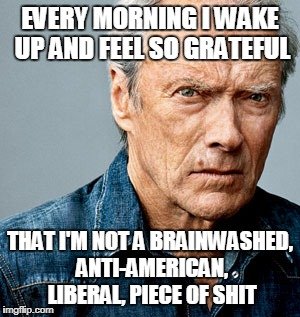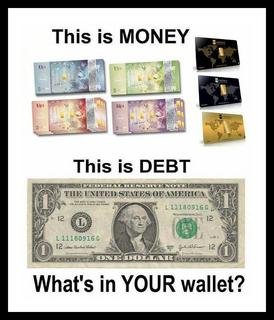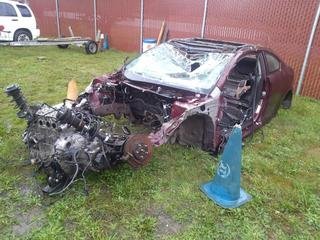What is Money? Part 1: Real vs. Financial Assets
Money isn’t a real resource. Gold doesn’t make money real, either.

Image from Target Freedom USA.
What is Money? Real vs. Financial Assets
Several months ago I started a series on Youtube titled Modern Monetary Theory for Conservatives, where I and my friend Nima Mahjour of economicsjunkie.com discuss modern monetary theory (MMT) from a libertarian/Austrian economics viewpoint. If you haven’t heard of MMT, don’t go a-googlin’ it just yet; you might pass a judgment it doesn’t deserve.
The majority of the MMT conversation on the internet is held by political progressives. A cursory search on Google for MMT will quickly draw up demands of free college education, Medicare for all, a federal job guarantee, and all other sorts of eye-rolling socialist gimmees. This generally turns the stomach of anyone who is even remotely conservative, and they go on their merry way grumbling about hippies and getting a job.

Honestly, Clint Eastwood’s face would have been enough to get the point across.
However, MMT is simply a description of economic and financial systems. It’s apolitical. The progressive MMT-ers are simply applying progressive political views onto MMT. The purpose of our MMT for Conservatives series is to give anyone with a conservative economic viewpoint (specifically libertarian or Austrian) a chance to hear out MMT without the lefty politics. Nima and I are also both anarchist/voluntaryrist in philosophical views, but we work to keep that out of it as well. The reason is this: let’s understand how the machine works before we decide what to do with it.
(You can check out our MMT for Conservatives Youtube series here.)
In our videos, Nima and I like to start off with a common libertarian economic idea and go from there. Thus I’m going to start this article in the same fashion. If you’re reading this with a Austrian economic understanding, you will likely get offended. Please let me know if you do; it lets me know that I’m doing my job right.
Libertarian thought to start this off:

There you have it. Case settled. (From the Amazing Gold Team)
My Response:
Why is it funny money? How is it counterfeit? Who is the government counterfeiting? Where is money supposed to come from if it doesn’t come from nowhere? It should be a natural resource in order to make it ‘real money’.
...right?
Money isn’t a real resource. Here's how we prove it. If all humans disappeared from the earth tomorrow:
- Gold would still exist. It’s a real thing.
- Money would cease to exist. It’s an abstraction of the human mind.
Saying gold is money because it has been used as money in the past is like saying inches are wood because rulers have been made of wood in the past.
So if money isn’t “real”, then what is it?
Money is financial in nature. Okay, so what the hell does that mean?
Financial Assets
Financial instruments, by definition, are both simultaneously a liability and an asset. A financial instrument is a promise to fulfill an agreement. For example, a mortgage is a promise for one person to pay another party a specific amount of money on a reoccurring period (usually every month), with a specific interest rate and a specific ending date. A house is generally used as collateral to secure the mortgage in the event that the borrower doesn’t pay according to the terms of the agreement.
In this example, the financial instrument (the mortgage) is a promise to fulfill an agreement by paying with money. While it would be impractical to do so, the mortgage could be fulfilled by paying with work. I’ll mow your lawn a thousand times over 10 years in exchange for your house. It could have been fulfilled with gold. Or rocks. Or sexual favors. It could be anything. Money is just the easiest thing to work with.

“I’ll give you 6% amortized. lol.” (Image Source.)
A mortgage is a financial instrument that creates a liability for the person borrowing money to buy a house. The mortgage his promise to pay another party. For the person holding the mortgage (the lender), the mortgage is an asset—a promise to get paid. The two sides of the mortgage are equal and opposite. The amount the one party is obligated to pay is exactly the amount that the other party is obliged to receive as payment. The two sides add up to zero, and thus were created out of nothing. The mortgage isn’t a real thing; it doesn’t exist. It’s an abstraction that describes how two parties are going to go about exchanging a house for money.
Where this becomes fascinating is that this financial instrument, the mortgage, can be sold or transferred to another party. The borrower doesn’t have to promise to pay a specific person—he can promise to pay whoever holds the note. This mortgage, an abstract promise created out of nothing that equals zero, can now circulate as a valuable asset to whoever holds it.
Any financial instrument fundamentally works this way. An asset is created because someone else offers up a liability, and this asset can be transferred or sold to another party.
Real Assets
A financial asset is different from a real asset. Any financial instruments adds up to zero, because the asset aspect of the instrument is an asset precisely because someone else has an equal but opposite liability. But if we add up real assets, the sum is a positive quantity.
For example, if I get a loan to purchase a car, there are two assets involved: a financial asset (the loan) and a real asset (the car). The financial asset is owned by the bank, and I own the financial liability associated with that asset (i.e. I have to pay the loan back), and I own the car. The amount I owe the bank is exactly the amount the bank can expect to be paid back, so the sum of the financial instrument is zero. However, even after the loan is paid and the instrument has been extinguished, the car still remains. This is because the car is a real asset. It physically exists and doesn’t get canceled out when exchanged.

Except when tweakers exchange cars. Then they get canceled out, like this one. (Image Source.)
Okay, so what is money then?
Money is the unit of measurement. The mortgage is the medium of exchange:
Money: a unit that measures value (in the same way a foot or meter measures length)
Medium of exchange: the thing being measured (analogous to a football field being measured in yards)
But is something “real” necessary to create money? No. In the example with the mortgage, the entirety of the agreement is an abstraction—the house itself is almost an afterthought. Two parties agreed to the terms described in the contract, but in the event someone doesn’t follow the terms, the house gets involved and a foreclosure occurs.
A loan can just as easily been made with no collateral. I give you money and you promise to pay it back per certain terms. It’s up to the terms of the agreement to decide what happens if I don’t pay it back. Do I go to debtor’s prison? Do you get my daughter as a slave? Can you lien my property? Or can I just thumb my nose at you because you have no way to enforce it?

This is magic plastic that gets you free shit if you don’t care about your credit report and collections agencies. (Do I really need to source this one?)
But this still doesn’t explain what money is. Just what are dollars? If the mortgage (medium of exchange) is being measured by a unit called dollar (money)—then what is that unit? And if it’s an abstraction, how can we all possibly agree to what it’s worth?
This is where our friend the government comes in. The government creates a special type of financial instrument called TAXES. This financial instrument differs from the mortgage or the car loan in that there is no choice involved. You can choose whether or not to buy a house or a car. However, you will pay your taxes—or else.
In the next article I will be exploring why tax instruments are unique in the world of financial instruments, and why they have been so successful at creating stabilized currencies required for modern economies. Stay tuned!
Read the next article: In the Beginning, Government Demanded Taxes
-Dylan Lawrence Moore
@volsci

Follow, re-steem, and share. Thanks!
Follow me on Youtube!
This is indeed a really interesting post....thanks for sharing.
Thanks for reading! As far as I know, me and my friend Nima are the only two approaching the subject of MMT from a "conservative" viewpoint. If you want to get more information, you can check out my other articles and YT videos, as well as Nima's page at economicsjunkie.com.
I’ll have to check out some of your videos about MMT, I haven’t heard of it before.
What’s the difference between the house and the car in your examples? Why is the car important as a real asset to the loan in the second one, but the house isn’t important to the mortgage in the first one? Wouldn’t it be the same situation - a loan for an asset/property?
Ah, sorry that's unclear! When I was talking about the house, I was focusing on the agreement between the two parties. In this case, the collateral (the house) is a bit of an afterthought of the financial instrument itself. It only gets involved in the terms of the instrument aren't followed.
When I was talking about the car, I was looking at the net balance sheet of the two-party economy in my example (me and the bank). If I add up all the assets and liabilities, both real and financial, of me and the bank, the only thing left is the car, because my financial liability cancels out with the banks financial asset.
Does that make sense?
... no :(
But that could easily be because I don’t know much of the vocabulary around finance, assets, etc. Probably would be easier for me to understand it if I were more familiar with those words and their definitions.
Damn. That's what I wrote the article to help with. :P
Thinking about the nature of Bitcoin is something that has really led me to thinking about the nature of money. It’s all about a society-wide consensus on a medium of exchange. The only reason Monopoly money doesn’t have value is because society has decided not to use it to represent value for real purchases. (But it has value in the game, because in that “world” everyone agrees to use it as money!)
Bitcoin has enough people agreeing that it has value for it to have a value, however, it’s an arbitrary value that changes daily. Interested to see what you have to say about how taxes factor into determining value. My guess was that stability is related to the size of the community that contributes to creating a consensus value. But I’m very much intrigued by this idea of the influence of taxes!
I like the way you're thinking, but this isn't correct. Fiat money has value because government demands it in taxes.
I've actually written an article (and done a YT video) precisely on this subject. Me and a friend of mine believe the value of BTC can be explains by comparing it to how taxes function. You can check it out here: https://steemit.com/bitcoin/@volsci/taxes-explain-the-value-of-bitcoin-what
I have a feeling you're going to love reading about my P.C. Theory...

COIN MAN by @pocketechange ...A penny may cost a dollar...